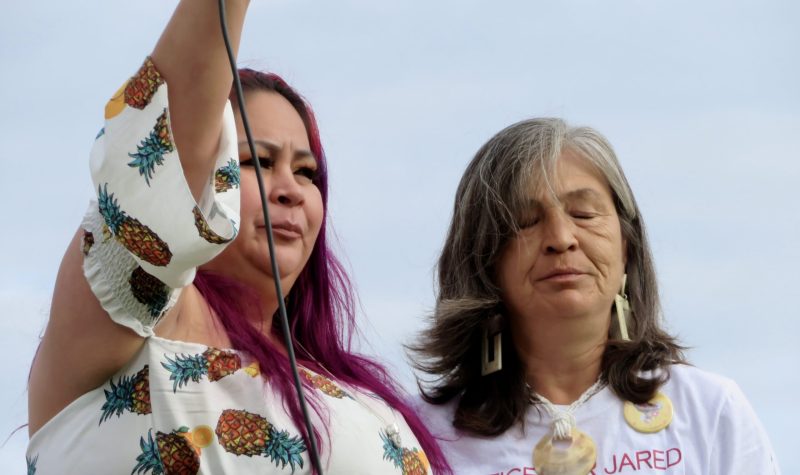Note: This story contains accounts of police violence, racism and hate against Indigenous people that could be triggering. Please listen with care.
Laura Holland, of the Small Frog house, Wet'suwet'en, sets up the hall at Homalco Nation for a memorial on July 7. The day marks a year since her son Jared ("Jay") Lowdnes was killed by Campbell River RCMP.
The walls are decorated with banners marking the monthly anniversaries up until this twelfth one. The first one is raw—spray paint on fabric. As the months pass, the banners become detailed with meticulously stitched appliqué letters. Holland’s grief work has included handwork, such as her beaded "Justice for Jared" belt.
Alongside her personal grief work, Holland’s work is holding the RCMP to account.
“Naming the shame that the RCMP have done, because I don't feel any shame," she said. "I don't feel ashamed of who I am. And I don't feel ashamed of who my son was. And I think a lot of times, people would like me to feel that they would like me to feel like a horrible person, like a horrible mother and that we deserve this. But I know different.”
She’s mustering all her strength to carry her through this, she says.
"I have enough power to do this. I'm going to turn my rage into action, and pain into power.”
Holland explains that there needs to be changes: all the services need to change, and she urges people to talk to their MLAs and MPs. Racism and discrimination in the police forces is a current conversation, and the next step is for governments to take action.
“We need to make our government do something, they need to change the laws, they need to change the policies, they need to protect us. They need to protect all of us, they need to serve all of us.”
Jared’s death is still under investigation by the Independent Investigations Office of BC [IIO]. There are three other investigations of deaths involving RCMP officers in Campbell River in the past year. Although the IIO is a civil oversight body, it is staffed by 50 per cent former police officers.
“At least 104 people were left dead through police actions last year in Canada,” writes Jeff Shantz for the Media Coop. He’s the lead on the Anti-Poverty/Criminalization/Social War Policing project. By May 2022, at least 44 have been killed. Shantz’s Media Coop phrasing of “at least” is deliberate.
“We must be cautious in this because, there is no formal and systemic mechanism of documenting and reporting police killings publicly in Canada. So, all numbers presented for police-involved deaths represent an undercount.”
Meenakshi Mannoe, criminalization and policing campaigner from Pivot Legal Society, believes that the lack of documentation and reporting is intentional.
"I would argue that the lack of formal and systemic mechanism for documenting and reporting police killings is purposeful,” explains Meenakshi Mannoe, criminalization and policing campaigner from Pivot Legal Society. “It enables federal, provincial and municipal police services to operate in silos.”
At the event, supporters sharing their voices included Martha Martin, mother of Chantel Moore, an Indigenous woman who was killed by Edmundston police in June 2020. Standing in solidarity were speakers from Defund 604 Network, Pivot Legal Society, Matriarchs and other friends and family.
“I'm so grateful to Laura for modeling so beautifully, how to move, how to keep fighting,” shares Mannoe. “How to bring people together, to share that grief and move together in a positive way that actually brings about transformational change.”
To learn more, see Justiceforjared.com
This work is funded by the Local Journalism Initiative through the Community Radio Fund of Canada.
Listen to the CKTZ story below:


